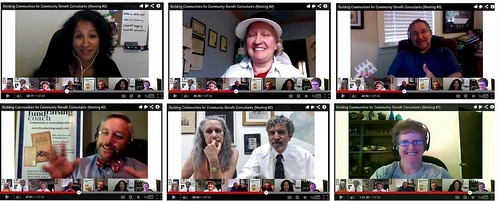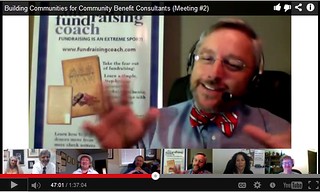 A common theme in so many conversations these days is the power of people with a common purpose, regularly gathering to learn from and support each other. Most of us have seen both sides of this coin – groups that flourish and thrive and nurture and grow, and groups that languish and eventually die.
A common theme in so many conversations these days is the power of people with a common purpose, regularly gathering to learn from and support each other. Most of us have seen both sides of this coin – groups that flourish and thrive and nurture and grow, and groups that languish and eventually die.
What, then, is the secret sauce – the favorable conditions that allow disparate individuals to gracefully become a true learning and growing community?
That is where the 2nd meeting of facilitators of Creating the Future’s online communities picked up on July 29. You can watch that meeting here and follow the Twitter stream there as well. The following is the summary of discussion at that meeting.
(If you are just joining this discussion for the first time, you will find our first meeting here, and the summary of that first meeting here.)
Participating in that meeting were facilitators from Creating the Future’s #NPCons Twitter chat for community benefit consultants (Jane Garthson, Nancy Iannone and Kevin Monroe), our Facebook group for Consultants to community benefit orgs (Marc Pitman) and Marlene Oliveira, who runs the #NPMC marketing chat (While not a program of Creating the Future, Marlene learned how to facilitate her chat by participating in the #NPCons chat, and then taking a class sponsored by Creating the Future on how to build community through Twitter chats).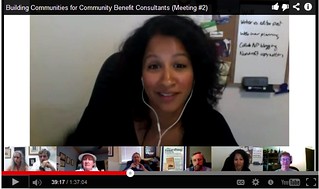
From Creating the Future, Hildy Gottlieb and Dimitri Petropolis were also present, and participating via Twitter were Justin Pollock, Allison Rapping and Kent Schell.
Having reviewed the summary of our first meeting, participants began by rooting themselves in what these communities make possible – a sense of connectedness, the power of meeting people who do similar work but take very different approaches.
And then they dove into the question that holds all the power to create change – the conditions for success. Here is some of what they shared.
The Power of Setting Expectations
The group talked about expectations in a variety of ways. As Jane noted, it is important to give people the space to be what they have the potential to be, but also important to “contain” the space – expectations that are rooted in “ground rules” and rituals and traditions. The group talked about the power of rituals and ground rules, to provide both structure and freedom, for the participants and for the facilitator – all rooted in the setting of expectations.
The “no self-promotion” rule in the consultants Facebook group was mentioned repeatedly throughout the session. That one rule establishes the expectation that the group is a place where people are expected to collaborate and think together vs. pitch at each other.
The group talked about the safe environment of the Facebook group, the #NPCons chat and Marlene’s #NPMC chat, commenting on the irony of how consistently people note that they feel safe in the chats, despite the fact that Twitter is 100% public.
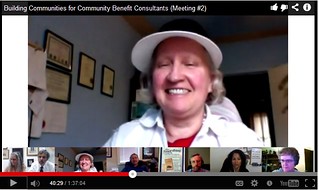 What are the shared expectations that create that safe environment?
What are the shared expectations that create that safe environment?
• The expectation of no-self-promotion (ground rule in the Facebook group)
• Balancing the “no self promotion” with the Friday Brag Basket – a place to self-promote like crazy! (Ritual in the Facebook group)
• The expectation that people will be asked to share their experience – the path that brought them to their current work (welcome-to-the-group ritual in the Facebook group) and the repeated invitation to share our own experience in both the Facebook group and the #NPCons chat.
• The framing of the questions (ritual in the Twitter chats)
• The expectation of providing more than hit-and-run links (modeled by facilitators in both Facebook and the Twitter chat). This was compared to most LinkedIn groups – the difference between “keeping the conversation in the group” and “go read my blog and never bring that conversation back to the group.” Jane noted that the encouragement to keep the conversation in the Twitter chat – asking people, “What is at the link you just posted?” allows people to stay very present in the chat. They stay in the moment.
• Ground rules are always explained in context – not just “the rule” but why. This moves the expectation from chastising to possibility. (Most applicable in the FB group)
Three comments in particular sum up nicely what these ground rules and rituals make possible.
Dimitri noted that these are all systems for inviting people’s wisdom, and that people love being asked to share their wisdom.
Kent Schell – participating via Twitter – noted, “Better to dialogue with each other in these conversations, than to comment at each other.”
And Justin Pollock – also participating via Twitter – noted, “Makes me think of David Rock’s Quiet Leadership. Are you listening to sound smart or really advance change?”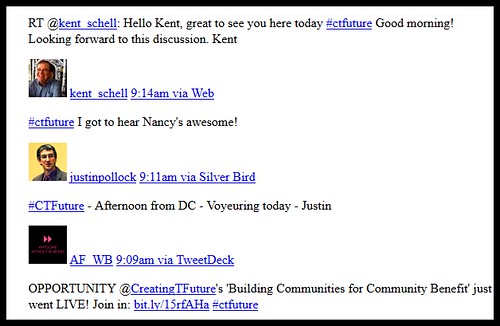
The Power of Modeling
One of the earliest comments in the discussion was Marc noting that he likes having a role (facilitating the consultants Facebook group) and that through that role, he is able to model as an example to others.
Modeling came up often in the conversation, in a variety of ways.
• Modeling is about being conscious, because we are all always modeling something, all the time
• Alison noted (via twitter) that modeling “fab group facilitation benefits internal processes. Thinking staff “process” – often all of us are facilitators.”
• Nancy talked about modeling vulnerability and safe space in facilitating the #NPCons chat. “Often the topics we choose to explore are things WE are struggling with. So we’re modeling what’s possible in a trusting community when you risk being vulnerable.”
• Marlene talk about the power of “being” a model vs. something we consciously do: “I didn’t know I was modeling anything!”
• Kevin shared the reasons he enjoys and grows from facilitating, talking about having more fluency in Creating the Future’s frameworks, and then modeling that while practicing.
Throughout the conversation, other observations circled back to this issue of modeling as “being it” vs. talking about it – regardless of what the “it” was.
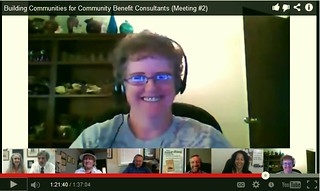 The Power of Facilitated Engagement and Invitation
The Power of Facilitated Engagement and Invitation
There is a huge difference between promoting and convincing people to do something vs. inviting and engaging. People love to be invited, especially when the invitation is sincere. But who among us loves to be promoted to / pitched at / convinced?
The preconditions for people feeling invited and welcomed included:
• The power of “Tell me more about…”
• People feeling heard and validated. Marc talked about the power of “likes” as a way for people to feel encouraged, validated, attended to (vs the actual word “I like this” – the like signifies “someone is hearing me”)
• Kevin talked about the power of attraction – who is attracted to the community, and why? He then listed what he gets from both the #NPCons chat and the FB group – a sense of connection, as well as “the opportunity to connect others to something that has meaning to me by inviting them to be part of it.”
• Mention was made here, too, of pull vs. push regarding limits on self-promotion (the conversation becomes pull conversation – i.e. inviting – vs. push)
• As someone who is not a facilitator of the Facebook group – but who joined Facebook just to join the group (wow for what that single action says about the group!), Marlene noted that the group is very welcoming. She talked about the effort made to welcome everyone to the twitter chat, to welcome every new person into the facebook group, to manually / individually invite people to the chat.
• The need to invite people at the level the invitee is at – to meet people where they are
We began to note roles that are needed for this level of invitation / welcoming to be maintained
• Greeter – person to say hello as people come in
• Re-engager (check on people who aren’t participating)
• Inviter – bring new people in
• RT / Like / Validate
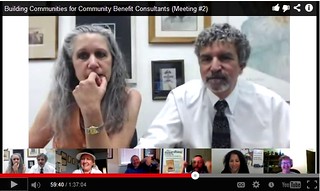 Lastly, Kevin invoked a wonderful image: What if we ask people how they benefit, and then create word clouds of “What NPCons means to me”?
Lastly, Kevin invoked a wonderful image: What if we ask people how they benefit, and then create word clouds of “What NPCons means to me”?
The Power of an Exploration Space
Part of what all the other aspects noted here make possible – rituals and ground rules, facilitated engagement, modeling the frameworks and principles – is exploration and discovery.
• Dimitri called these communities a “no-smarty-pants zone” – that people expect that they will be encouraged to explore vs. just show off how smart they are. “I expect in that group that I will be helping to build new wisdom, and by that, I grow.” This is a huge thing for consultants, who are paid to be a smarty-pants!
• Justin noted via Twitter that “ideas once shared, are no longer really owned. Twitter exemplifies this.” He then encouraged us all (not just those in the meeting) to “up the ante. As consultants we should ask of ourselves to learn as much as we ask of our clients. #NPCons is an avenue for that.”
• Hildy noted that participants in the FB group and in both Twitter chats consistently say, “I’m becoming something because of this community that I wasn’t without this community. Yes, I learn new tools and tips. But I am personally growing.” Talking about the personal growth hidden within the professional.” Marc wondered if we should be more explicit about people’s personal growth, and the group talked for a while about the Continuum of Potential that Creating the Future works with, noting that there is a continuum along which we all find ourselves, in what degree of our potential we are ready to reach for. For some people, personal growth is an attractant. For others, a turn-off. Again it is about meeting people where they are, so they can explore what THEY want to explore.
Perhaps the best summing-up of this theme came from Kent Schell via Twitter:
“Could it be that well led “exploration” itself will result in stronger connection, dialogue and therefore benefit?”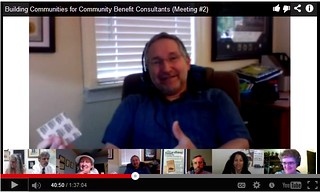
Summary
Throughout the discussion, the group kept coming back to what these communities make possible for the participants and the facilitators – which makes sense, because each person in this meeting has had a powerful enough experience in these groups to be as involved as they are!
What’s next:
This group will be meeting again on Thursday, August 22 at 9am PT / 12noon ET. Our discussion will move from “favorable conditions for success” to roles and structures and infrastructure that create those conditions. To watch / participate in that meeting, subscribe to this blog, and you will get notified of the specifics for that meeting.
Reflection:
Before closing out the meeting, participants were asked to share what stood out for them in the discussion. Here is what they shared:
Jane: Reinforcing the importance of one-on-one invitations and follow-up
Kevin: “It takes a village to steward a community.”
Justin: As a participant – Camaraderie in muddling thru. Appreciate any answer is just a stab to get it right, and that group continuously is willing to ask “is there a better right?”
Marlene: What I thought were lessons I learned from this group seemed new to other members of the group – things we didn’t realize we were already doing. “I’m copying things that you’re not even aware you’re doing.” A sign that group members have been modeling it by “being it” vs. consciously doing it.
Marc: People come to this for personal reasons, and they’re not good or bad, it’s just where they are. We’re all at different points in our life, and we can have more grace for people where they are.
Nancy: The number of roles we take for granted – how many pieces there really are as we prepare for a chat – the invitation, the welcoming, the retweeting to share with networks AND to nurture the person. The engaging between meetings, or following Marlene’s chat, to support her. There are many pieces to maintaining the community, lots of people are doing it, based on the modeling they’ve seen. People are asking clarifying questions, RT’ing etc.
Kent: I sense I should pay more attention to FB!
Dimitri: The effectiveness of all of this is due to the team of people involved. The more people are working as a team, the more powerful it is. But the real power comes not from “assigned” roles but from when people WANT to participate in that way, because it builds the participation.
Hildy: How often in the meeting people used the word modeling – people are absorbing and moving into different venues based solely on what they’re experiencing that is powerful. Modeling a sense of humor!
As we begin talking about roles and structures, we begin to see the power of focusing the conversation first on what is possible, and then on creating the favorable conditions for that possibility to become reality. We see that this is no less practical – in fact it is more practical – than establishing rules to prevent bad things from happening. We are instead creating favorable conditions to encourage good things to happen. And if that is of interest to you, join us on Thursday, August 22nd for Meeting #3 in our efforts to create thriving communities of practice, online and in real life!